Sachar Dental NYC
For SAME day / emergency appointments
Call (212) 752-1163
All the below content has been written by NYC Dentist, Dr. Sandip Sachar.
Snoring and Sleep Apnea Treatment in NYC
On this page: (Click topic below)
- What is Sleep Apnea
- Causes of Sleep Apnea
- Signs and Symptoms of Sleep Apnea
- Health Risks of Sleep Apnea
- Diagnosis of Sleep Apnea
- Sleep Testing
- Treatment of Sleep Apnea
- Oral Appliances for Snoring / Sleep Apnea
- Insurance Coverage for Sleep Apnea / Snoring Treatment
- Why we are the best for Sleep Apnea Treatment
Introduction to sleep apnea and snoring
Sleep apnea is a common sleep disorder that affects breathing during sleep, often leading to loud snoring and interrupted rest. One of the most noticeable signs of sleep apnea is snoring caused by blocked airways, which can disrupt not only your sleep but also that of your loved ones. Thankfully, there are effective solutions available, including oral devices designed to keep your airways open and help you breathe better throughout the night. These devices are a simple, non-invasive option for many people looking to manage sleep apnea and improve their quality of life.
What is sleep apnea?
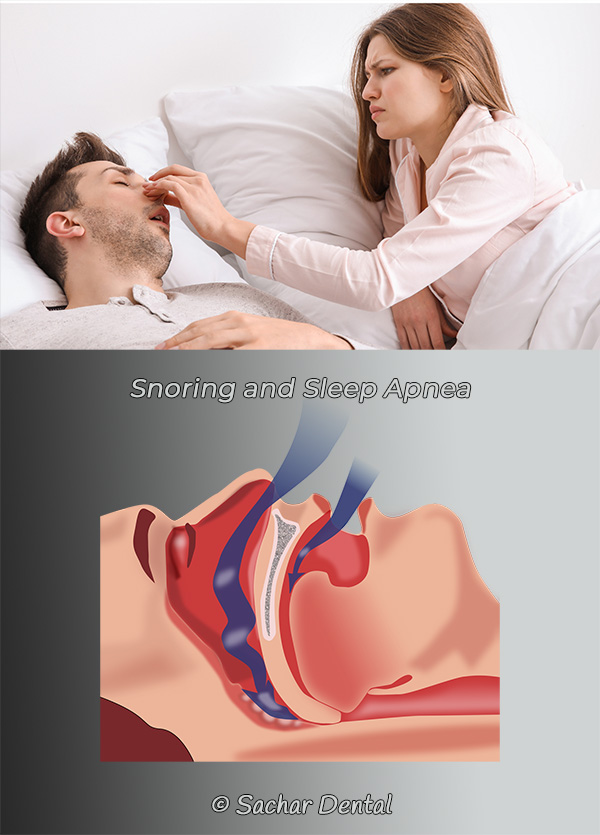
Sleep apnea is a sleep disorder where breathing repeatedly stops and starts during sleep. These pauses in breathing, known as apneas, can last from a few seconds to a minute or more and may occur dozens or even hundreds of times each night. Sleep apnea disrupts your natural sleep cycle, often leaving you feeling tired and groggy during the day, even if you think you got enough rest.
There are three main types of sleep apnea:
- Obstructive Sleep Apnea (OSA): This is the most common type and occurs when the muscles in the throat relax too much, causing a blockage in the airway.
- Central Sleep Apnea (CSA): This less common form happens when the brain doesn’t send the proper signals to the muscles that control breathing.
- Mixed or Complex Sleep Apnea: A combination of both obstructive and central sleep apnea.
Who Is at Risk for sleep apnea?
Anyone can develop sleep apnea, but certain factors increase the risk. These include:
- Being overweight or obese
- Having a large neck circumference
- Smoking or drinking alcohol
- Nasal congestion or anatomical issues like a deviated septum
- Family history of sleep apnea
Sleep apnea is more common in men, but women and children can also experience it.
How Does Sleep Apnea Affect the Body?
When breathing stops during sleep, the body reacts by waking you up just enough to restart breathing. These disruptions are often so brief that you don’t remember them, but they can prevent you from reaching deep, restorative stages of sleep. Over time, untreated sleep apnea can contribute to serious health problems like high blood pressure, heart disease, stroke, diabetes, and even memory or mood issues.
What Causes Sleep Apnea?
Sleep apnea occurs when something interferes with the normal flow of air through the upper airway during sleep. The causes can vary depending on the type of sleep apnea, but they generally involve physical, neurological, or lifestyle factors that affect breathing.
For Obstructive Sleep Apnea (OSA), the most common type, the primary cause is the relaxation of the muscles in the throat during sleep. This relaxation can cause soft tissues, like the tongue, tonsils, or uvula, to collapse or block the airway, making it difficult for air to pass through. Structural factors, such as having a small jaw, enlarged tonsils, a thick neck, or a naturally narrow airway, can also increase the likelihood of airway obstruction. Additionally, being overweight or obese is a significant contributor to OSA, as excess fat around the neck and throat can press on the airway.
For Central Sleep Apnea (CSA), the issue stems from the brain rather than the airway. CSA occurs when the brain doesn’t send the proper signals to the muscles that control breathing. This can be linked to conditions such as stroke, heart failure, or other neurological disorders. Certain medications, especially opioids, can also disrupt the brain’s ability to regulate breathing patterns during sleep.
Understanding the causes of sleep apnea is essential for effective treatment. By addressing the underlying factors—whether through lifestyle changes, medical interventions, or specialized devices—it’s possible to significantly reduce or even eliminate symptoms, improving both sleep quality and overall health.
Signs and Symptoms of Sleep Apnea
Sleep apnea can present with a variety of signs and symptoms that affect both nighttime sleep and daytime functioning. One of the most noticeable signs is loud, persistent snoring, which is often interrupted by pauses in breathing or gasping sounds as the body struggles to reopen the airway. However, not everyone with sleep apnea snores, and there are other key symptoms to watch for.
During the night, individuals with sleep apnea may experience restless sleep, frequent awakenings, or a sensation of choking or smothering. Some people wake up multiple times to use the bathroom (nocturia) or wake up with a dry mouth, sore throat, or even headaches due to the lack of oxygen during the apneas. Many people with sleep apnea are unaware of these nighttime disruptions because they are often too brief to remember, which is why the condition is frequently noticed first by a bed partner or family member.
Daytime symptoms are another major indicator of sleep apnea. Individuals often feel excessively tired, even after what seemed like a full night of sleep, because the repeated breathing interruptions prevent them from entering the deep, restorative stages of sleep. This can lead to difficulty concentrating, memory issues, irritability, or mood swings. Sleep apnea sufferers may also find themselves nodding off during quiet activities like reading, watching TV, or even driving, which can be dangerous.
Left untreated, these symptoms can worsen over time, affecting not just sleep but also overall health and quality of life. Recognizing the signs early is crucial to getting the right diagnosis and treatment to restore healthy, uninterrupted sleep.
Health Risks of Sleep Apnea
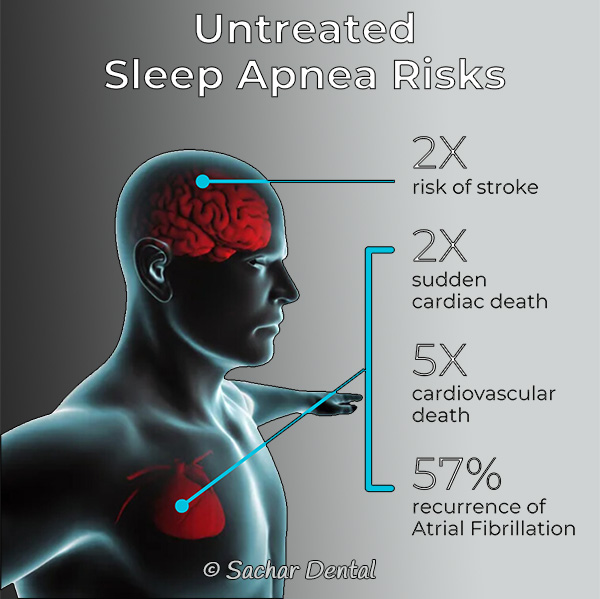
Sleep apnea is more than just loud snoring or feeling tired—it’s a serious medical condition that can harm your health in many ways. When untreated, sleep apnea causes your breathing to stop repeatedly during sleep, which lowers oxygen levels in your body and puts extra stress on your heart and other organs. Over time, this can lead to serious complications.
- Heart Disease: One of the biggest risks is heart disease. Sleep apnea increases your chance of developing high blood pressure, irregular heartbeats (arrhythmias), heart attacks, and even heart failure. The repeated drops in oxygen force your heart to work harder, creating strain that can lead to long-term damage.
- Stroke: Another major concern is stroke. People with sleep apnea are more likely to experience a stroke, especially if their condition is untreated. This is because poor oxygen levels and high blood pressure can damage blood vessels, increasing the risk of blockages or bleeding in the brain.
- Diabetes: Sleep apnea also has strong links to diabetes. The condition disrupts how your body uses insulin, the hormone that controls blood sugar. This can lead to insulin resistance and raise the likelihood of developing type 2 diabetes.
- Mental Health: Mental health can suffer as well. Sleep apnea affects your ability to get restful sleep, leaving you feeling tired, irritable, or even depressed. It can also impair memory, focus, and decision-making because your brain isn’t getting the oxygen it needs during sleep.
- Immune System: Left untreated, sleep apnea can weaken your immune system, making it harder for your body to fight off infections. It can also worsen existing conditions like asthma or chronic obstructive pulmonary disease (COPD).
The good news is that these risks can be reduced with proper treatment. Recognizing the symptoms and seeking help from a medical or dental professional trained in sleep apnea care is a crucial step toward protecting your health.
Diagnosis of Sleep Apnea
Getting a diagnosis for sleep apnea is an essential first step toward better health and restful sleep. Since the condition often goes unnoticed by the person experiencing it, it usually starts with someone else noticing the symptoms, like loud snoring, gasping for air during sleep, or extreme daytime fatigue
The process typically begins with a detailed medical history and symptom review. You will be asked about your sleep patterns, snoring, tiredness, and any known risk factors, like obesity, family history, or certain health conditions such as high blood pressure.
One of the most common methods for diagnosis is a home sleep study. This test is conducted where we monitor your breathing, oxygen levels, heart rate, and snoring, while you sleep. Sensors and equipment record the data to determine whether you have sleep apnea, and how severe it is.
A home sleep apnea test (HSAT) is a portable device that measures information—like airflow, snoring, breathing patterns, and oxygen levels—while you sleep in your own bed. It provides essential information to confirm the sleep apnea condition and severity.
A dental exam by our trained sleep apnea experts, assists in the diagnostic process by evaluating your oral anatomy. We may examine the size of your tongue, tonsils, or jaw alignment, which can contribute to obstructed airflow.
Early diagnosis ensures that effective treatment options—including custom dental appliances—can be introduced to improve both your sleep and overall health.
Pre-Screening for Sleep Testing
Pre-screening is an important first step to determine if you might benefit from a sleep test. During this process, we will evaluate common signs and risk factors for sleep apnea. This includes reviewing symptoms like loud snoring, daytime fatigue, frequent waking during the night, or reports of choking or gasping while asleep. We will also ask about your medical history, including high blood pressure, obesity, or a family history of sleep disorders. We will perform an oral exam to identify a narrow palette, inadequate space for the tongue, a collapsed bite, or wear signs on the teeth often associated with a breathing disorder.
Pre-screening helps identify if a sleep test is necessary and ensures that the evaluation focuses on patients most likely to benefit from the sleep testing. By catching potential signs early, pre-screening paves the way for timely diagnosis and treatment.
Sleep Testing: Understanding At-Home Sleep Tests
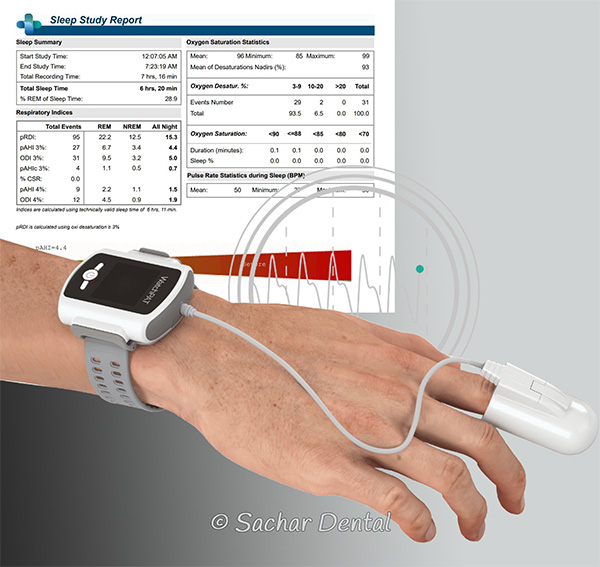
At-home sleep tests are a convenient way to screen for sleep apnea in the comfort of your own home. These tests collect vital data while you sleep, such as blood oxygen levels, the number of desaturation events (drops in oxygen levels), and whether your snoring patterns indicate a blocked airway. They also monitor body position, which can reveal how sleeping on your back or side affects your breathing, as well as the depth of your sleep, including how often you enter REM (the restorative phase of sleep). By analyzing this data, our sleep doctor can determine if you have sleep apnea and assess its severity.
After treatment begins, such as using a custom dental sleep appliance, follow-up sleep testing is often performed to evaluate improvements while using the sleep appliance. These follow-up tests help track changes in oxygen levels, breathing interruptions, and overall sleep quality, ensuring the treatment is effective. With guidance from our sleep doctor, at-home sleep testing offers a simple, yet powerful way to understand and manage your sleep health.
Treatment Options for Sleep Apnea
Sleep apnea treatment focuses on improving airflow, reducing breathing interruptions, and enhancing overall sleep quality. Options range from lifestyle changes, like weight loss or altering sleep positions, to medical devices and therapies.
Many patients may benefit from custom dental sleep appliances that gently adjust the position of the jaw and tongue to improve breathing. Traditionally, a Continuous Positive Airway Pressure (CPAP) machine was the standard for anyone with sleep apnea. While these CPAP machines are often effective, new advances in dental sleep appliances have proven to be an effective alternative to CPAP. These dental appliances can replace CPAP which is difficult to use, difficult to travel with, annoyingly cumbersome, and disruptive to sleep partners. In cases of sleep apnea due to structural anatomy, surgical procedures might be recommended to remove obstructions or restructure the airway.
Treatment plans are tailored to each individual, often combining multiple approaches to achieve the best results.
Oral Appliances for Snoring and Sleep Apnea
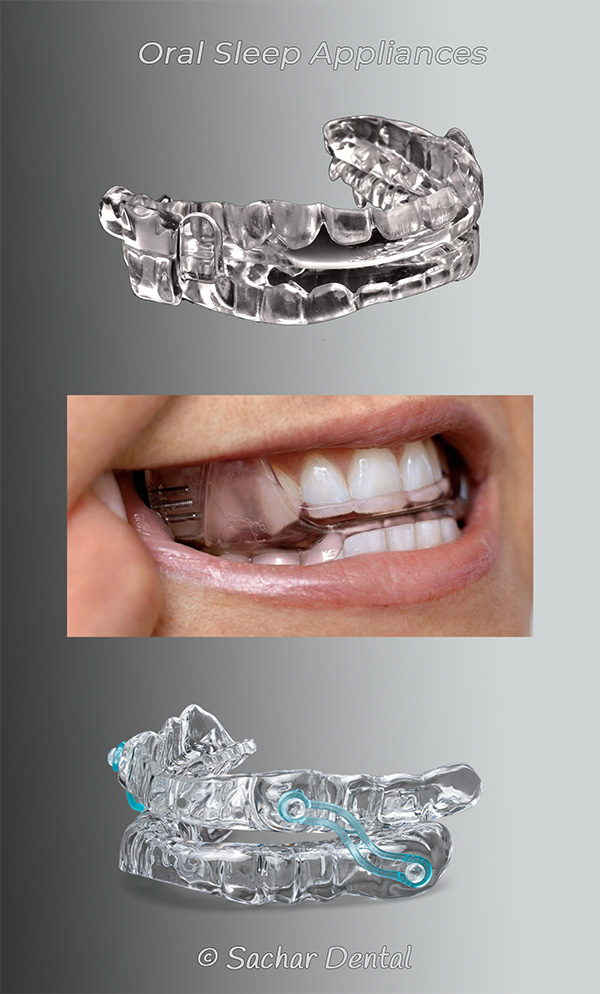
Oral appliances are a comfortable, non-invasive treatment option for managing snoring and mild to moderate sleep apnea. These custom-fitted devices are worn in the mouth while sleeping. They work by gently repositioning the jaw and tongue to keep the airway open, reducing the chances of obstruction that leads to snoring or apnea episodes. For many patients, oral appliances are an appealing alternative to CPAP machines, offering portability, quiet operation, and ease of use. Modern designs are slim and adjustable, allowing for a personalized fit that enhances comfort and effectiveness. These appliances are often recommended for individuals who struggle with CPAP compliance or have positional sleep apnea.
Custom Oral Appliances Created with iTero Scanning Technology
Creating a custom oral appliance starts with precision and advanced technology. At our office, we use the iTero scanner to capture a detailed 3D image of your teeth and jaw. This cutting-edge, radiation-free scanning process is quick, comfortable, and highly accurate, ensuring a perfect fit for your appliance. Once the scan is complete, the data is sent to our specialized laboratory, where skilled technicians craft your custom sleep appliance using high-quality materials. This tailored approach guarantees that your device is designed specifically for your unique anatomy, maximizing comfort and effectiveness in treating snoring or sleep apnea.
How the Custom Appliance Works
The custom sleep appliance is carefully designed to fit snugly in your mouth, resembling a slim, ergonomic mouthguard. It works by gently repositioning the lower jaw and tongue to keep the airway open during sleep. The appliance’s design prevents the collapse of soft tissues in the throat, which can block airflow and cause snoring or apnea episodes. Its lightweight, adjustable structure allows for both comfort and optimal effectiveness, ensuring minimal disruption to your nightly routine. By supporting proper airflow, the appliance not only reduces snoring but also helps alleviate symptoms of sleep apnea, improving your sleep quality and overall health.
When used consistently, oral appliances can significantly improve sleep quality, reduce daytime fatigue, and lower health risks associated with untreated sleep apnea.
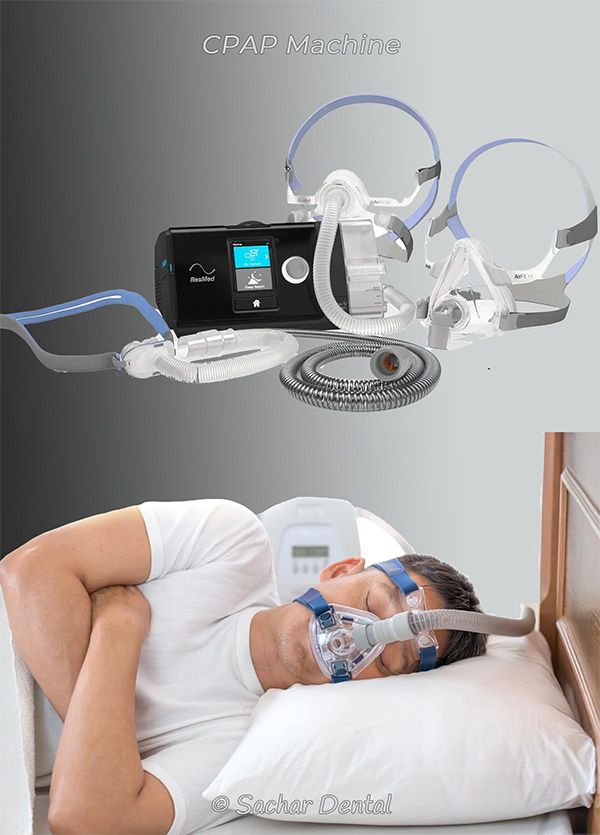
Insurance Coverage for Sleep Apnea Treatment
Treating sleep apnea is an important investment in your health, and insurance can help make it more affordable. Unlike regular dental visits for cleanings and checkups, sleep apnea treatment is often covered under medical insurance rather than dental insurance. Our office accepts both, ensuring that you have comprehensive options to help manage the costs of care. Medical insurance typically covers the initial evaluation for sleep apnea, including consultations and screenings, as well as at-home sleep testing. It also covers the scanning for, and creation of custom oral appliances. It also covers related follow-up visits to monitor your progress and adjust the device as needed.
Our team is here to help you navigate your insurance benefits and maximize coverage, so you can focus on getting the treatment you need to improve your sleep and overall well-being.
Transparent Medical Benefits Verification for Sleep Apnea Treatment
Our team is dedicated to making your sleep apnea treatment as seamless and stress-free as possible. Before starting any treatment, we always check your medical insurance benefits to ensure that visits, sleep tests, and the custom appliance are covered. We review important details like copays, deductibles, and coinsurance to provide you with the most accurate estimate of out-of-pocket costs, upfront. This ensures complete transparency, so you’ll know what to expect financially before beginning your care.
We accept all PPO medical insurance plans to maximize coverage. If your medical insurance is not accepted, we’ll inform you right away and provide you with alternative options, including affordable cash pricing for patients without insurance, interest-free financing solutions through CareCredit and Lending Club, making it easier to fit your treatment into your budget. Our goal is to provide accessible, high-quality care while keeping your experience financially worry-free from start to finish.
Why we are the best choice for Your Sleep Apnea and snoring Treatment
When it comes to treating sleep apnea and snoring, our practice stands out in NYC as the premier choice for effective, patient-centered care. Dr. Sachar is highly trained in sleep apnea treatment and brings a wealth of knowledge and experience to every patient interaction. Using the latest advancements in technology, we offer in-office evaluations, cutting-edge at-home sleep testing devices, and custom oral appliances made from the newest materials to ensure maximum comfort and effectiveness. Dr. Sachar’s expertise ensures that each treatment plan is tailored to your unique needs, with a focus on improving your sleep and overall health.
Our commitment to excellence extends beyond the clinical side. Our highly trained staff specializes in navigating the complexities of insurance benefits, helping you understand coverage options and minimizing out-of-pocket costs. From the initial consultation to follow-up visits, we’re here to guide you every step of the way with a focus on transparency and exceptional care. Choosing us means choosing a team dedicated to using the best technology and expertise to help you achieve better sleep and a healthier life. Don’t wait—schedule your consultation today and take the first step toward restful, restorative sleep!


